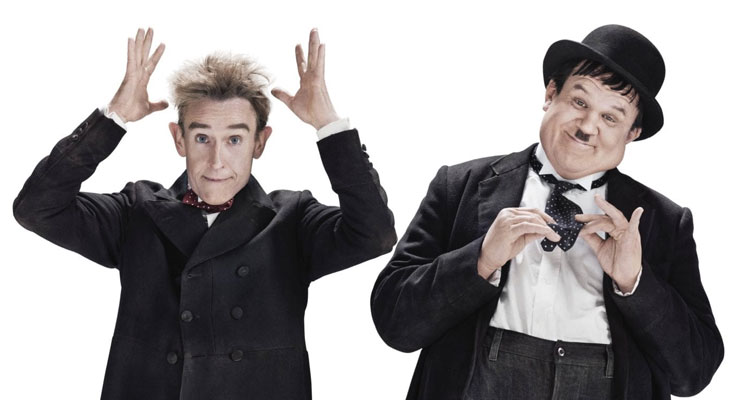Stan & Ollie (UK / Canada / USA / PG / 97 mins)
In short: Beautiful bromance
Directed by Jon S. Baird. Starring Steve Coogan, John C. Reilly, Shirley Henderson, Nina Arianda, Rufus Jones, Danny Huston.
The Plot: It’s 1953 and the hugely popular cinematic double act of Stan Laurel (Steve Coogan) and Oliver Hardy (John C. Reilly) is still going strong. This is many years after their Hollywood heyday in the 1930s, but they still have that magic chemistry and ability to make audiences laugh uncontrollably. The problem is that audiences appear to be dwindling. At least on this cross-country tour of post-war Britain where they’re performing live on stage, with their respective wives Ida (Nina Arianda) and Lucille (Shirley Henderson) in tow. Stan is negotiating a deal for a new picture, a Robin Hood-style adventure. This stage show is just a warm-up, but complications ensue when Ollie’s health deteriorates and Stan bristles at Ollie doing a picture without him many years ago. The show must go on though…
The Verdict: Among all the comedy greats of the Golden Age of Hollywood, Stan Laurel and Oliver Hardy are arguably the most memorable. Not just as an iconic double act, but also as comedic geniuses whose different personalities played off each other to rib-tickling effect. Jon S. Baird’s new dramatic film Stan & Ollie takes a nostalgic look back at their enduring partnership – onscreen and offscreen. However, this is no rose-tinted, wide-ranging biopic. Instead, Baird narrows the focus down to a particular few weeks in their latter years for added poignancy and dramatic effect. By narrowing the focus, there’s more time to examine just what made them tick as actors, comedians, husbands and most importantly, friends.
The film starts in 1937, with a gentle reminder of their Hollywood years and onscreen magic under the direction of noted producer Hal Roach (Danny Huston). Not that this film really needs a reminder. What follows in 1953 is more than enough to fill in the blanks, as we follow the duo through one small town venue to another to a climactic show in Ireland. They’re being short-changed by their tour manager though, who prefers to keep his larger venues for a rising young comedian by the name of Norman Wisdom. Their stage shows re-visit scenes from their films, but Stan still likes to write new material to keep things fresh. While they wait for that film deal to come through, they clash over personal choices they’ve made in briefly going solo. When push comes to shove though, these two are inseparable.
If there’s one thing to take from Stan & Ollie, it’s that these gifted comedians had a beautiful bromance. That’s at the heart of this touching film, which portrays them as being like an old married couple. Forget their wives, who also bicker beautifully with each other in a number of well-written scenes. This is a platonic love story of sorts between two men who came to rely on each other for everything. You couldn’t have one without the other, a fact that both of them come to realise all too well. One of the most effective scenes simply involves Stan holding an ailing Ollie’s hand and apologising, with Ollie returning in kind. It tells you all you need to know about their friendship in just a few seconds.
Coogan and Reilly do sterling work, getting the tics, mannerisms and comedic timing of the double act but wisely steering clear of making them caricatures. Coogan is given the more emotionally demanding role, the brains behind the partnership. Reilly responds in equally fine form by peeking out of the chunky prosthetics and portraying the heart of the partnership. They spark off each other brilliantly, as do Henderson and Arianda. While there’s nothing revelatory about Stan & Ollie, it works just fine as a character piece. It’s strengthened by the performances, attention to detail (keeping in the looping footage goof during Way Out West’s dance routine) and genuine affection for its subjects. Cinephiles will be delighted, but there’s plenty here for everyone to enjoy.
Rating: 4 / 5
Review by Gareth O’Connor


